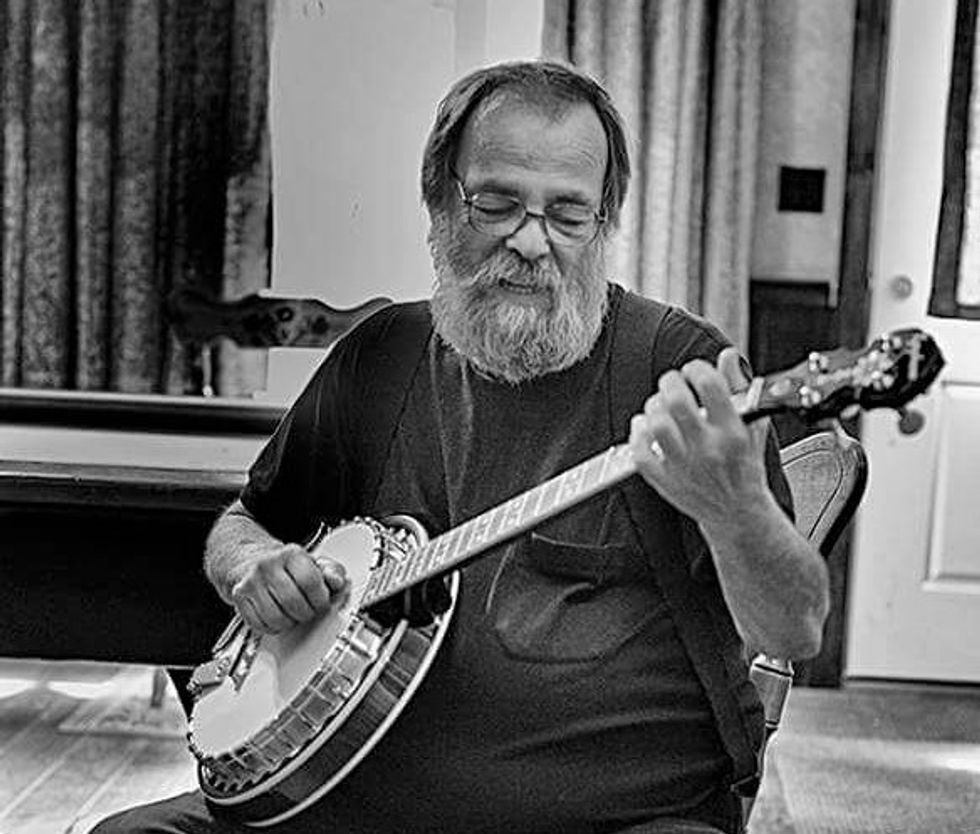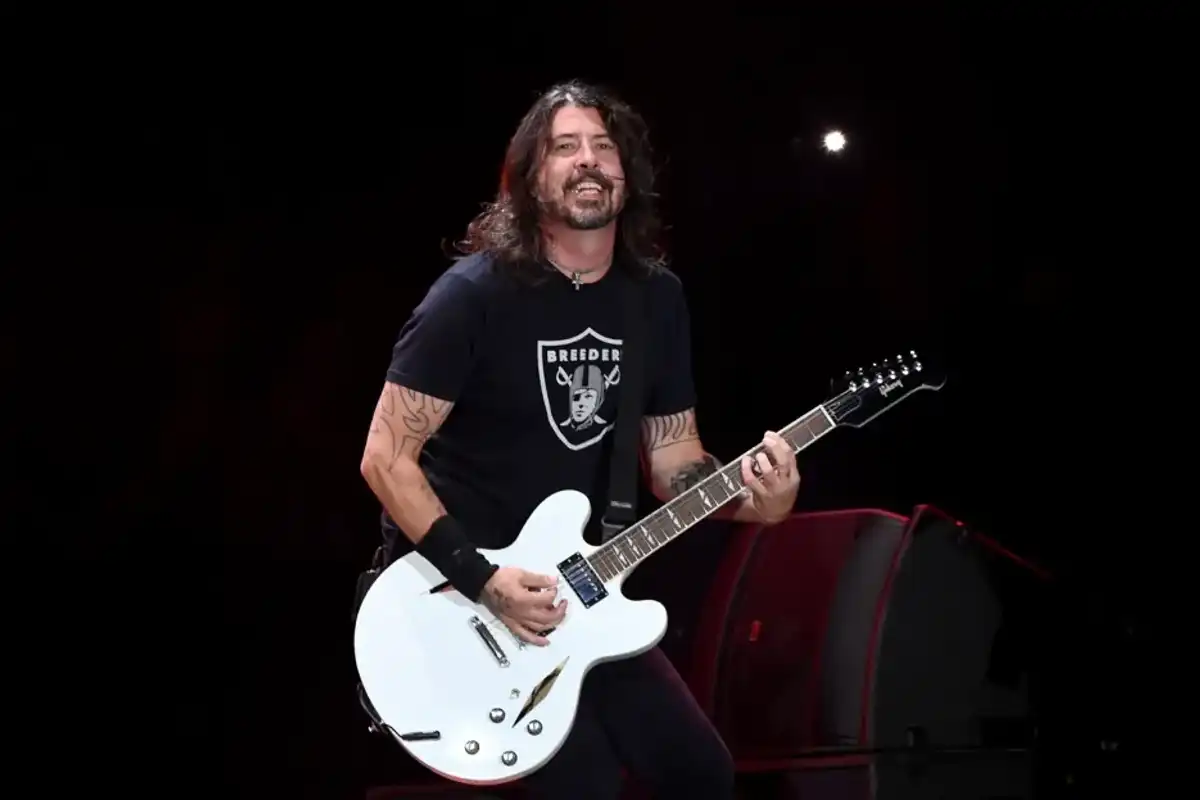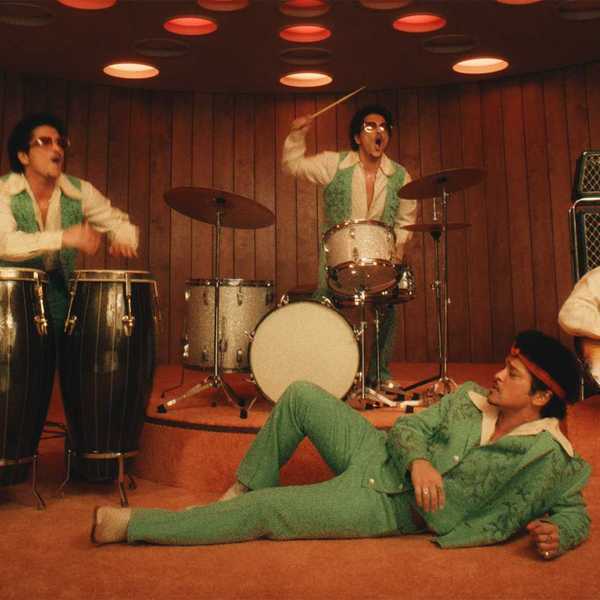Jay Aymar's Personal Reflection On Mitch Podolak's Legacy
Singer, songwriter and guitarist Jay Aymar pens a touching eulogy for his friend Mitch Podolak who died Sunday in Winnipeg.

By External Source
Singer, songwriter and guitarist Jay Aymar pens a touching eulogy for his friend Mitch Podolak who died Sunday in Winnipeg.
The world lost one of its premiere folk music ambassadors this weekend: Mitch Podolak. Imagine Mt. Rushmore without Lincoln.
This is a huge loss.
Personally, I've lost a spiritual advisor, intellectual jouster, artistic curator, employment counselor, employer, breaded veal cutlet impresario and eventually – a friend.
I've just put the finishing touches on my first political album entitled A War for Love. The second song, Songs of Peace and Freedom, was inspired by one of our conversations.
Lyrics:
"You say it takes a single brick into one pain of glass to start your revolution to free your working class."
Sadly Mitch will never get to hear this album and yet I was writing it with him as one of the ideal listeners.
Over these next few weeks, you’ll be able to find more tributes pouring in than Trotskyites at a workers union rally. They will all mostly say the same thing - his was a war for love.
Who is Mitch, you may ask? Let’s start with this CBC piece culled from the newswire this morning:
Mitch Podolak, founder of Winnipeg Folk Festival, West End Cultural Centre, dies.
Podolak was known Canada-wide for influence in creating music festivals
CBC News · Posted: Aug 26, 2019
Mitch Podolak, the founder of the Winnipeg Folk Festival, has died, family says. (CBC - Thacker)
A legend of Manitoba's music scene, Mitch Podolak, has died.
Podolak was the founding artistic director of the Winnipeg Folk Festival and the founder of Winnipeg's West End Cultural Centre and played a role in the creation of music festivals across the country.
"He was my hero, and he uplifted anyone who had an idea, good or bad if they were passionate about it," his son, Leonard Podolak, wrote in a Facebook post Sunday evening.
"Creating festivals was his way of starting the Revolution. And what a revolution it has been."
Mitch Podolak died from complications related to septic shock, his son told CBC News.
Podolak was a force in Manitoba's music community. After co-founding the Winnipeg Folk Festival in 1974, he had a hand in the creation of more festivals across the country, including the Vancouver Folk Music Festival.
'A true visionary'
An outpouring of tributes to Podolak on social media began Sunday evening shortly after Leonard Podolak's post, including posts from the Winnipeg Folk Festival, the West End Cultural Centre, Manitoba Music, and Prairie Sky Books.
In a post on Facebook, the Winnipeg Folk Festival honoured Podolak and offered condolences to his loved ones.
"More than one of our founders, he was a father, a friend, a leader, a mentor, a true visionary. We owe so much of who we are to him," the Winnipeg Folk Festival wrote in a Facebook post.
"Mitch, your love for and dedication to folk music and our community will always be a part of us."
Podolak was made a member of the Order of Manitoba in 2015 and received an honourary Doctor of Laws from Brandon University the same year. He was also honoured with a lifetime achievement award, the Unsung Hero Award, from the Canadian Folk Music Awards in 2013.
In 2017, supporters donated $35,300 in four days to a GoFundMe drive to raise money to help Podolak renovate his home following major surgery on his spine that required him to use a walker.
His son wrote the family will be holding a memorial for his father in the future.
Eventually, you’ll read about his loving wife Ava who is one of the most stellar, witty, fierce women you’ll ever meet. My deepest condolences to the entire family.
About 11 years ago now, I received a lovely email from Mitch, offering me a spot on his Home Routes circuit. This was a new concept (well, a new spin on an old concept) of having folk music enthusiasts host house concerts across Canada. The hosts of each concert volunteer their time and homes to facilitate these intimate concerts which are unplugged and often have 50 or more paid attendees at the ready. Us working folk musicians (every 2 or 3 years) apply to get on the circuit to play about 12 shows in a few provinces. In having been accepted to do four over the years (#5 is this November in SK/MB) I can say it’s a beautiful adventure. Not only do we receive first-class hospitality from the hosts, but we also receive a respectful listening audience who often become fans and supporters for the rest of our careers.
Up until 2017, the small but mighty Home Routes organization maintained their office in a discreet downtown Winnipeg location which felt more like a home than an office (they’ve since relocated). The dedicated staff of approximately five people coordinated this ongoing tour of Canadian folk musicians performing in private residences across the country. The logistics of such an endeavor are unfathomable. It operates almost as though a charity organization would - operating costs at 15% and what little money does go around – it feels just perfect for the cause afoot. Tim Osmond, the current artistic director, banjo player, new father, and all-around superhuman, is running a lot of the day-to-day at the moment. I am really feeling for Ava the children and Tim and the inner circle today. Mitch was one of the great humans!
When I was offered my first Home Routes tour, it led to a few phone conversations with Mitch that soon found us on the phone consistently. He became a true champion of my work and would often call with little messages of support.
Believe me, when you’re an obscure artist, working in a traditional medium, writing long-form narrative songs in an age of eleven-second attention spans, having the nod of approval from a cultural guru in your field means everything. It’s like oxygen and sunlight to an aspiring sunflower. One day, we had an hour-long conversation about his early days in Toronto working at the Bohemian Embassy in the heyday of Toronto’s Yorkville scene.
I’d just had Ian Tyson record my song My Cherry Coloured Rose and Mitch wanted to share a few anecdotes about his early interactions with Ian and Sylvia. Back in the day he was a young teen doorman at The Bohemian Embassy, and his coworkers were a variety of hippies, music enthusiasts and one friend with intellectual disabilities who would forever consider Mitch a true friend. I’ve read a lot about those years from people on the scene like Bernie Finkelstein (True North) and friends like Jane Harbury who ran the Riverboat, but it was these unvarnished conversations with Mitch that made me feel like I was front row centre. As a long lost Gen-X’er, with a huge curiosity of this scene, I felt honoured to be offered such candid insights.
“Yeah Mitch, it’s interesting you say that about Ian and Sylvia. It’s rare when two voices automatically create that kind of magic” (much like today’s Canadian duo The Small Glories – JD Edwards and Cara Luft – SEE THEM ASAP).
“Mitch, my brother called a few days ago to tell me that Ian was on CBC TV responding to the interviewer's questions about the great reception to my song he covered. He noted that Tyson was getting a bit perturbed with this attention to the album's one cover song etc.…”
Mitch was quick to shower Ian with superlatives for his canon of work and creative gifts but came to my defense in saying “Jay, if he loved your tune enough to record it, then he should only be singing your praises. If someone pisses me off, I’m always tempted to leave a dead fish on their doorstep! I don’t do duplicitous bullshit well."
And that’s how our conversations went. He understood the plight of the artist and fought hard to defend our integrity.
Our last few meetings were all about his desire to have me (or other interested parties) start a folk festival in my home town of Sault Ste. Marie, Ontario. Just having Mitch mention the Sault in this capacity was noteworthy.
“Jay, I’ve long been interested in starting a folk festival in the Sault. Eighty-thousand people with a diverse population. There is so much cultural heritage to promote and enjoy there. I’ve never understood why the Sault didn’t have a long-standing folk festival.”
“Well Mitch, I guess it’s more of a rock ’n’ roll and country music town. It’s a steel town. Not too many folkies!”
This was not an acceptable answer. Mitch saw it as faulty logic. If we can agree that folk music is the backbone of all music, then this argument falls flat. After an hour-long discussion, I finally said: “Ok, then what would be some of your top guiding principles to starting a great folk festival.”
His answer was surprising.
“You need to find a central location with ample parking and power.”
“Hmmm…Like Bellevue Park,” I responded.
“I’d have to come and see it. I think if I get out of this wheelchair, I’m going to make a special trip to the Soo and we can do a walkabout. After that we can discuss funding, boards and volunteers.”
Whoa...he was serious. I'd better not approach this lightly. Alas…that day never came.
I could go on and on (as countless others are currently doing this morning upon hearing of Mitch’s passing), but I’ll leave you with an email conversation between us that went back and forth for several weeks approximately ten years ago.
I’d written a blog piece questioning the validity of political songwriting.
I posited that many political songs didn’t withstand the test of time. They are often time-stamped, and history feels unkind to them. I referenced artists I love in the piece: Pete Seeger, Bruce Cockburn, and Woody Guthrie. I argued for and against their use of specific themes in their songs.
It elicited the following email response from Mitch (which I re-posted with his blessing at the time.). In reading this, I sensed the middle section might have been stock copy he’d sent to others like me before, but perhaps that’s my cynical nature taking over. I’d like to believe not.
Thoughtful, caring, dedicated to a cause, articulate, and action-oriented. He made a positive difference in this world and fought hard for social justice of the disenfranchised. What ‘s nobler than that? I can't think of anything.
Mitch, you are already missed more than you know.
Rest in Peace.
(Can you believe that my computer just auto-corrected Rest in Peace to Rest in Pete? – did you do that?)
Mitch's email response to my blog piece.
“This Machine Kills Fascists ….Or something like that.”
Hi Jay, Interesting piece. I understand the cynicism about being linked to causes that you’re not sure about or don’t agree with. What’s true is that very often people take a stand they don’t understand, in my opinion, Rocket Launcher is a good example. What Bruce had to say about it sounded good at the time, given the opportunity to fire a rocket launcher at an Army Helicopter in Guatemala that was attacking civilians, I doubt Bruce would. Killing fascists, It’s a matter of belief and steely-eyed courage. With a rocket launcher or a baseball bat, it’s a really good idea. Ask my dead relatives about fascists. Really interesting song in retrospect.
Every once in a while I read a piece like yours which, if I understand it correctly, says “I’m a writer and I’m working hard and struggling and I’m essentially not political and in some ways resent the inherited and implied politics of the folk scene being thrust on me, which is why I have herein parodied the words ('this machine kills fascists') written on the guitar of the most universally respected and iconized folk writer (Pete Seeger) probably in history who happened to be very political”.
Is that a fair analysis? If not read no further. I’m writing out of respect, not from an argumentative headspace.
Some years ago I was talking about Pete Seeger at the Winnipeg Festival, back in the days when I was running it, he was there that year, on the other side of a canvas wall, unknown to me was Norman Blake and Bryan Bowers. Bowers is an old friend of mine and he told me this story. Norman Blake hated Seeger because Seeger was 'a red'. Norman writes all these very touching political songs about working folks in Appalachia but as a high school product of McCarthyism, he couldn’t draw the line between what he believes and Pete’s beliefs, which when brought down to the short hairs, are not that different. They weren’t spying on me on purpose; it just happened. I was so pleased that Seeger had showed up that I was gushing to a reporter and Blake went ballistic, he went back to the hotel because he was so pissed at me. A couple of days later he was doing a concert in Calgary at one of the clubs and he attacked Pete, red baited Pete from that stage and half the audience got up and left, and a couple of folks told him to fuck off. Bowers asked me about it a year later when I next saw him. I didn’t know about them being on the other side of the canvas wall until then, I did know about the Calgary deal and I was as curious about Norman's reaction. Bowers was curious about my reaction. I didn’t know what to say, so I presented to Bowers a small historical outline that I’m going to present to you for your consideration.
The entire existence of the folk music market place in North America is, in the long term, a direct result of the work of the American Communist Party. Coming from a European tradition where folk music was more closely linked to the working class, the leadership of the CPUSA was looking for a link to American workers, and some wag in Moscow thought it was a great idea. So the Party started Sing Out magazine and Peoples Songs and the Almanac Singers and they literally made folk music the political assignment of Pete and Woody and a whole bunch of others. For the most part, with the exception of providing a musical soundtrack to the rise of the CIO, and directly to the civil rights movement and the anti-Vietnam war movement, the American Communist Party was bypassed and never got out of it what they put into it. They never made that emotional connection with the mass of American workers, though their ranks rose to 175, 000 members in the USA in 1947. This is what brought on McCarthyism.
The period I’m referring to is 1945-1975. This is the time we often hear bandied about as the “urban folk revival” which is because the CPUSA got a bunch of urban intellectuals interested in folk music and the whole thing took on a life of its own. City people started getting interested in the banjo because Pete played the banjo and once they started learning how to play, they discovered the traditional side of folk music and then discovered (Pete's younger brother) Mike Seeger. It was a wonderful convergence of ideas and history. Some of those people started the Newport and Philadelphia folk festivals, which started to create a mass (relatively) audience for folk music. Estelle Klein, who really established Mariposa as a big deal came through the same communist front Jewish organization that my folks came through, and so did Gary Cristall (Vancouver Folk Fest). A huge amount of the infrastructure groundwork for the North American folk scene was done by Commies or their kids. It just happened that way. A number of festivals, Home Routes, the Winnipeg International Children’s Festival and the West End Cultural Centre owe their historical existence to the fact that I’m a Seegerite, etc.
Political music is a major component of what we refer to as folk music. The body of work is immense. We have the last 500 years pretty much covered.
I don’t know whether you resist that “folk” designation as a writer. I think you’re a great folk writer, but whatever you choose, the fact is that you as an artist, starving or momentarily with resources, the gigs and the existence of many of the gigs you and your many colleagues get to play, are the historical rebounds from that CPUSA led initiative in the late 1940’s.
All of which brings me to the point that “This Machine Kills Fascists” needs to be respected.
Your friend and fan,
Mitch
---
So long my friend!
Where Have All The Flowers Gone – Pete Seeger
Where have all the flowers gone?
Long time passing
Where have all the flowers gone?
Long time ago
Where have all the flowers gone?
Girls have picked them every one
When will they ever learn?
When will they ever learn?
Where have all the young girls gone?
Long time passing
Where have all the young girls gone?
Long time ago
Where have all the young girls gone?
Taken husbands every one
When will they ever learn?
When will they ever learn?
Where have all the young men gone?
Long time passing
Where have all the young men gone?
Long time ago
Where have all the young men gone?
Gone for soldiers every one
When will they ever learn?
When will they ever learn?
Where have all the soldiers gone?
Long time passing
Where have all the soldiers gone?
Long time ago
Where have all the soldiers gone?
Gone to graveyards every one
When will they ever learn?
When will they ever learn?
Where have all the graveyards gone?
Long time passing
Where have all the graveyards gone?
Long time ago
Where have all the graveyards gone?
Covered with flowers every one
When will we ever learn?
When will we ever learn?
















